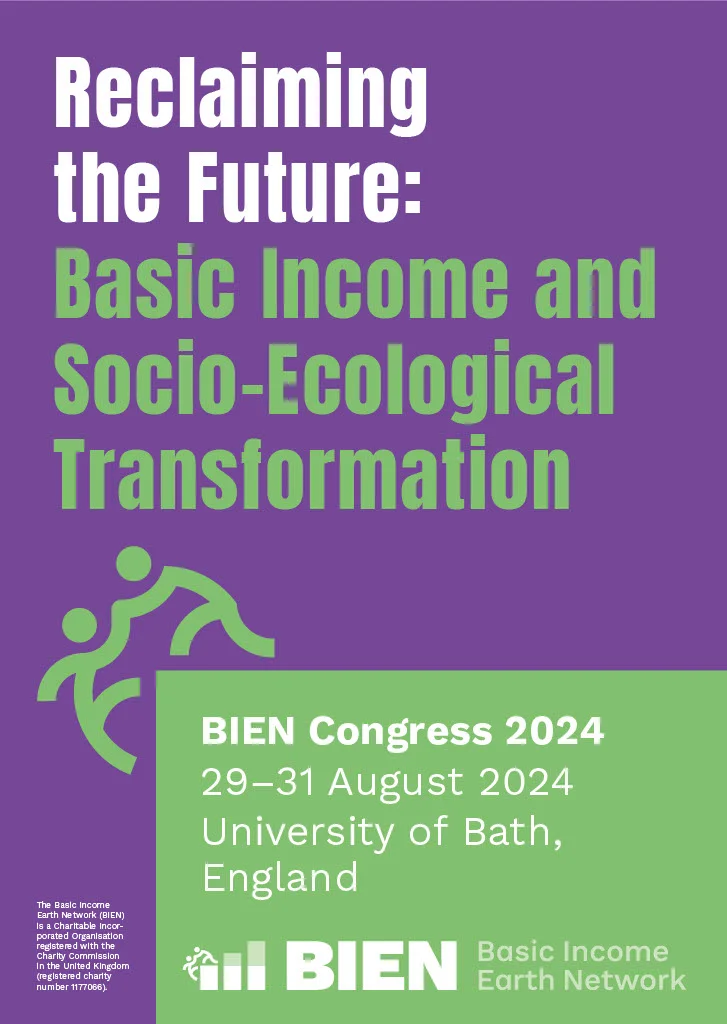[알림] 2024년 8월 29~31일, 제23차 기본소득지구네트워크(BIEN) 대회가 열립니다
전 세계 기본소득 운동과 연구성과를 공유하고 기본소득 논의를 심화하는 제23차 기본소득지구네트워크 대회(23rd Basic Income Earth Network Congress)가 2024년 8월 29~31일, 영국 바스대학교에서 열립니다. (대회 웹사이트: https://www.bien2024.net/ )
“미래 되찾기: 기본소득과 사회생태적 전환(Reclaiming the Future: Basic income and socio-ecological transformations)”을 대회 주제로 하고, 대부분의 세션 프로그램이 오프라인과 온라인으로 동시에 진행됩니다. (BIEN의 2024년 의안을 다루는 제23차 기본소득지구네트워크 총회(General Assembly)는 대회 둘째 날인 8월 30일 오후 1~3시, 한국시각 오후 9~11시에 온라인으로 열립니다.) 프로그램을 비롯한 자세한 대회 정보는 여기에서 확인할 수 있습니다.
대회 참가등록은 2024년 8월 15일까지입니다. [참가등록하기]
Congress theme
미래 되찾기: 기본소득과 사회생태적 전환
(Reclaiming the Future: Basic income and socio-ecological transformations)
2024년 기본소득지구네트워크 대회(BIEN Congress 2024)는 경제적으로 정의롭고 정치적으로 포용적이며 생태적으로 지속 가능한 세계로의 사회적 전환을 위한 급진적 도구로서 기본소득이 가진 잠재력에 초점을 맞춥니다.
우리는 여러 상호연결된 중대한 도전들에 직면해 있습니다. 기후변화, 전 지구적 불평등, 우익 포퓰리즘, 기술적 혼란(technological disruption) 등이 그런 도전입니다. 보편적 기본소득의 옹호는 부분적으로 이런 도전들에 응답하는 기본소득의 역량으로 이해되어야 합니다. 그러나 정치적 성공을 가로막는 핵심 장벽들이 여전히 있습니다. 우리는 여전히 국가적 맥락에서 기본소득을 실시하는 못하고 있고 많은 사회보장체계들이 더욱 징벌적이고 덜 보편적이게 되고 있는 가운데, 일부 옹호자들 사이에서는 기본소득이 현 상태의 이해관계 혹은 이윤 추구적 이해관계에 의해 포획되고 빚어지는 위험이 점점 커지고 있다는 우려가 있습니다.
이런 점이 아래와 같은 광범한 질문들을 하게 합니다.
– 기본소득은 근본적 사회 전환의 수단인가 아니면 현 자본주의 시스템의 부정의들을 개혁하고 고치기 위한 도구인가?
– 보편적 기본소득은 흑인의 생명도 소중하다(Black Lives Matter), 배상, 에코페미니즘, 포스트성장 같은 사회적 전환 및 사회 정의를 위한 서로 붙어 있는 정치운동들과 어떻게 연결되는가?
– 보편성 또는 무조건성의 원칙에서 벗어난 정책안들은 얼마만큼 보편적 기본소득으로 가는 길에 도움이 되는가, 혹은 그렇지 않다면 얼마만큼 기본소득의 급진적 또는 전환적 잠재력을 갉아먹는가?
– 사회적으로 전환적인 결과를 획득하기 위해서는 어떤 원칙들이 기본소득 정책 설계, 옹호, 연구, 실험(pilots)에 적용되어야 하는가?
– 실험 개입은 종종 기본소득이 노동공급이나 경제활동에 미치는 영향을 시험하도록 설계되지만, 더 급진적인 버전의 보편적 기본소득 연구팀들이 우선시해야 하는 다른 (더 전환적인) 지표들이나 아이디어들은 어떤 것이 있는가?
– 어떻게 하면 실험 세계(world of piloting)를 넘어서서 감지 가능한 변화와 더 폭넓은 정치적 동원 및 정책 변화를 달성할 수 있는가?
Congress theme
BIEN Congress 2024: Reclaiming the Future. Basic Income and Socio-Ecological Transformation
BIEN 2024 is focused on basic income’s potential as a radical tool for social transformation towards an economically just, politically inclusive and ecologically sustainable world.
We face a number of interlinked critical challenges, including climate change, global inequality, right-wing populism and technological disruption. The case for UBI must be understood in part in its capacity to respond to these challenges. However, there are still key barriers to political success. The implementation of a UBI in a national context continues to elude us, many social security systems are becoming more punitive and less universal, while there are concerns among some advocates that basic income is under increasing danger of being captured and shaped by status-quo or profit-seeking interests.
This motivates a wide range of questions, including but not limited to:
– Is basic income a vehicle of radical social transformation, or a tool to reform and rehabilitate the injustices of our current capitalist system?
– How does UBI connect to adjacent political movements for social transformation and social justice, such as Black Lives Matter, reparations, eco-feminism, or postgrowth?
– To what extent do policy proposals that deviate from the principles of universalism or unconditionality take us on the road to a UBI, or alternatively to what extent do they undermine its radical or transformative potential?
– What principles should guide basic income policy design, advocacy, research or pilots in order to achieve socially transformative outcomes?
– Pilot interventions are often designed to test the impact of a basic income on labour supply or economic activity, but what other (more transformative) indicators or ideas should be a priority for research teams in a more radical vision of UBI?
– How can we move beyond the world of piloting to achieve tangible change and wider political mobilisation and policy change?



